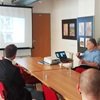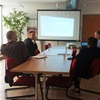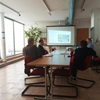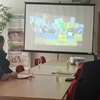Visible Means of Support
Minulý týden proběhla veřejná přednáška profesora Jeroma Krase z Brooklyn College of the City University of NewYork na téma Místní a globální dopady války na Ukrajině.
Public seminar will be held in Dům národnostních menšin
31. 5. 2024 from 9:00 to 10:30 AM
Lecturer:
Professor Jerome Krase, PhD, Emeritus and Murray Koppelman Professor, Brooklyn College of the City University of NewYork.
Annotation of the presentation:
As noted by Peirce K. Lewis writing about the axioms of the American cultural landscape “...all human landscape has cultural meaning, no matter how ordinary that landscape may be.” So it follows that we can “read the landscape as we might read a book.” Naturally this applies to all human landscapes which are “...our unwitting autobiography, reflecting our tastes, our values, our aspirations, and even our fears, in tangible, visible form.” In this visually enhanced presentation, I hope to convincingly demonstrate how support for or against important public issues is shown in what John Brinckerhoff Jackson called “vernacular landscapes,” – that which “...lies underneath below the symbols of permanent power expressed” in the “Political Landscape.” These visible forms, or as I have ironically phrased it, “Visible Means of Support” are expressed in many ways such as demonstrations and signage. Among the many public issues addressed here are the COVID-19 Pandemic, the October 7th Hamas attack on Israel, and the response by Israel in Gaza. Of course, the most pertinent issue given the “Local and Global Impacts of the War in Ukraine” conference here at Charles University, is support for Ukraine after the invasion by Russia.
About the lecturer:
Although born in New York, Jerome Krase is of Ukrainian descent and is not only a sociologist but has a background in history and philosophy. He also has experience in the U.S. military, as well as working with NGOs. Importantly, he is the president of the European Academy of Sciences of Ukraine (EUASU), which is a non-governmental organization, the main purpose of which is to pursue the promotion and advancement of science and scholarship in Ukraine and worldwide (https://euasu.org/). In addition to his connections to the Ukrainian diaspora, he collaborates with Ukrainian sociologists and other academicians in Ukraine. He is media-savvy, having worked with Radio Free Europe, for example. One of his specializations is visual sociology. In addition to being able to assemble scholars to help achieve the project's goals, he is an experienced editor who ensures the quality of the publication output. He has edited a number of publications for Palgrave and Routledge and is co-editor of the Scopus journal Urbanities, Journal of Urban Ethnography.




